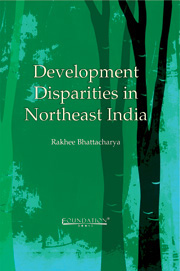Book contents
- Frontmatter
- Contents
- Preface
- List of Figures
- List of Tables
- 1 Challenges of Disparity in the Northeast
- 2 Dimensions of Disparity in the Northeast
- 3 Facets of Government Finance in the Northeast
- 4 Economy of Insurgency in the Northeast
- 5 Energy Interplay in the Northeast
- 6 Development Initiatives in the Northeast
- Index
4 - Economy of Insurgency in the Northeast
Published online by Cambridge University Press: 05 June 2012
- Frontmatter
- Contents
- Preface
- List of Figures
- List of Tables
- 1 Challenges of Disparity in the Northeast
- 2 Dimensions of Disparity in the Northeast
- 3 Facets of Government Finance in the Northeast
- 4 Economy of Insurgency in the Northeast
- 5 Energy Interplay in the Northeast
- 6 Development Initiatives in the Northeast
- Index
Summary
Critical Consequences of Unresolved Puzzles in Northeast India
The government's role and its policies have not been very successful in Northeast India. An extensive misutilization of development funds has led to other critical social issues and conflicts in this region. Security thus has gained equal importance as development, and both are undermining each other in this region. The issues of conflict and violence arose from an extremely complex scenario, rooted in the economic, political, social, ethnic, religious and many other ramifications in Northeast India. The issues in the region have been over simplified by attributing all threats to the political aspirations of some groups of people that have been repressed by economic neglect. But as events have proved, the root cause probably lies far deeper and is much more complex and trans-historical. Northeast India's unresolved issues and grievances have caused proliferation of insurgency and underground militancy for the last several decades. Insurgency in Northeast India is explained by many as a long and legitimate struggle of the people for securing their right to self-determination. Such proliferations are bound to have a direct bearing on its already strained economy. Development needs an environment of stability, peace and security, which Northeast India has not had. The region, for several decades, has been synonymous with terrorism, drugs and arms trafficking, corruption, money laundering, cross border migration and ethnic conflicts. These have devastated its political, economic and social fabric.
- Type
- Chapter
- Information
- Development Disparities in Northeast India , pp. 91 - 128Publisher: Foundation BooksPrint publication year: 2011



